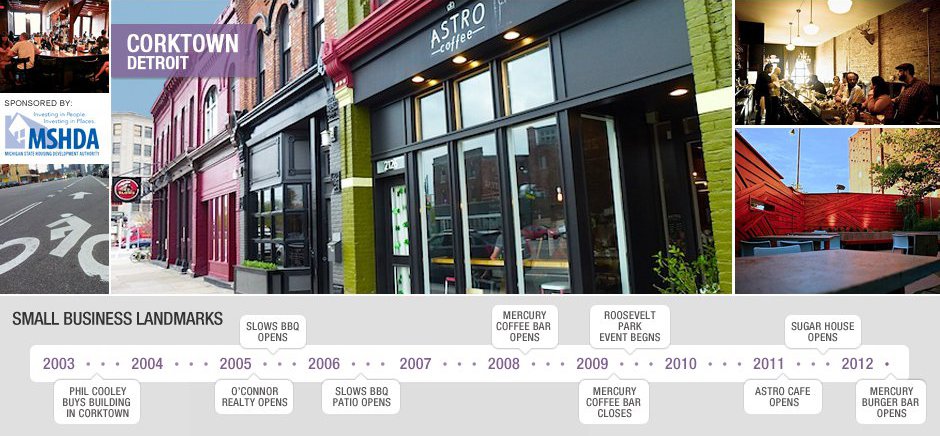Slows growth: How one cool biz transformed a neighborhood

When Slows Bar-B-Q opened in 2005 on a desolate stretch of Michigan Avenue, Detroiters were enthusiastic but skeptical: years of over-hyped “renaissance” that never materialized had caused them to be wary. The restaurant, positioned defiantly in the shadow of Detroit’s defunct train station, was considered an outlier, not something that would spark the revival of an entire zip code.
Fast-forward to 2012:
the block of Michigan Avenue between Wabash and 14th Street that is home to the now nationally-known barbecue joint also boasts a real estate office, an upscale coffee shop, a classic cocktail bar, a boutique inn, a burger restaurant, and a recording studio. Even a dive bar– the one business on the block that predates Slows — has had a facelift.
These changes did not come swiftly. For the first few years, the area remained much as it had pre-Slows, noted more for its large abandoned structures than as a dining or business destination. But Slows’ owner Phillip Cooley, supported by his family, has a  long-ranging vision for the neighborhood that encompasses much more than barbecue.
long-ranging vision for the neighborhood that encompasses much more than barbecue.
Cooley’s family has been in real estate for three generations in Marysville, a small town near Port Huron. When Cooley made his plans to open Slows, his excitement was contagious; the family decided to take a chance not just on a restaurant but on the city of Detroit. They invested in several buildings on the same block as Slows and elsewhere in the city, focusing their efforts on Corktown.
Up and down Michigan Avenue, the buildings owned by the Cooleys are easy to spot — even the few as-yet-unoccupied properties sport bright, freshly-painted facades. A detail such as this can go a long way in a city where many owners of vacant properties can’t even be located, let alone paint. Over the course of a couple years, the entire family made Corktown their home. Phil lived in a loft above Slows until last year, and remains in the neighborhood in a recently acquired Slows’ owner Phillip Cooley, supported by his family, has a long-ranging vision for the neighborhood that encompasses much more than barbecue. multi-use building dubbed Ponyride. Brother Ryan Cooley and his wife Meghan McEwan relocated from Chicago in 2004 and were followed in 2005 by parents Ron and Patty Cooley, who are active members of their adopted community. Ryan opened O’Connor Realty next to Slows in 2006, and McEwan runs Honor and Folly, an inn located in the loft space recently vacated by Phil.
Nowadays, the flurry of business openings belies the fact that not every venture has been smooth sailing. In 2008, Cooley was a partner in the Mercury Coffee Bar, a café directly opposite Slows that was open a mere four months. The coffee shop, with its beautiful design and lofty goals of using all local food products, was well loved among foodies and coffee cognoscenti. However, management was inefficient, and their offerings at too high a price point for the neighborhood and economy at that time; Cooley was quoted in the Detroit News as saying that the café was losing $280 every day it was open.
Despite the financial and psychological In 2010, aforementioned ‘dive bar’ LJ’s Lounge was given a makeover, and that stretch of Michigan Avenue was repaved and bike lanes added. setbacks of the café, Cooley continued to believe in the neighborhood, and in 2009 he began spearheading projects to revitalize Roosevelt Park, the green space in front of the train station. Slowly but surely, other signs of progress were manifest: in 2010, aforementioned “dive bar” LJ’s Lounge was given a makeover, and that stretch of Michigan Avenue was repaved and bike lanes added. That same year, Dave Kwiatkowski started renovating a building two doors down from Slows, with plans to open a craft cocktail bar. Daisuke Hughes, a former barista at Mercury Coffee Bar, rehabbed the space next door (leased by the Cooleys) for a new coffee shop; Astro Coffee opened its doors in July 2011. Although it was slow going for Kwiatkowski getting the necessary city permits and licenses, the Sugar House was finally ready in October 2011 and was promptly voted the city’s best new bar on entertainment website Metromix.
The most recent business on the block–a mere few weeks old–is perhaps the most illustrative of the neighborhood’s turnaround. Mercury Burger Bar occupies the location of the failed coffee shop, and like that business, sources almost all of its food ingredients locally, using top quality products like beef that is ground fresh daily. Only time will tell the Burger Bar’s fate, but with the block now abuzz just about every night of the week and the overall economy showing signs of growth, the timing seems right.
It would be easy to say that Slows Bar-B-Q impacted the surrounding community like a pebble casting ripples across a pond’s smooth surface, its success creating inevitable waves of economic growth. However, the area’s development was neither that simplistic nor that passive; rather, it was the result of a concerted effort toward improvement. In addition to his work in Roosevelt Park, Cooley is well known for lending a hand to the neighborhood’s fledgling businesses, and Corktown’s continued renewal can be directly attributed to this community-oriented, “bigger picture” attitude of its business owners.
Photos by Marvin Shaouni and Walter Wasacz





